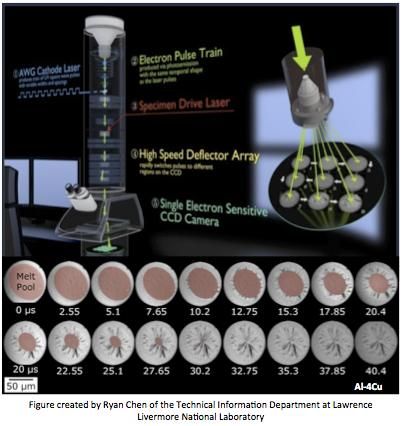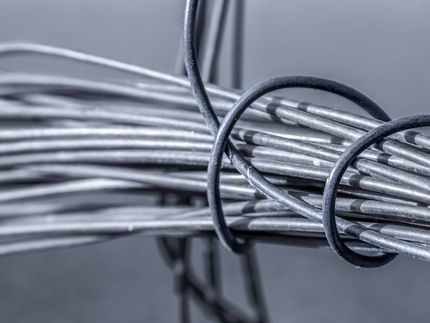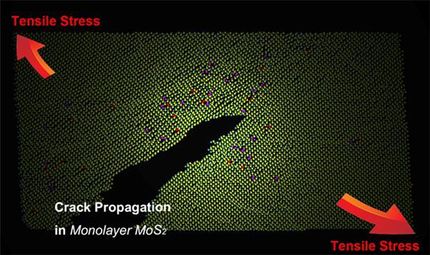Grant to study aluminum alloy microstructures form in real time
A grant from the National Science Foundation will enable researchers at the University of Pittsburgh to utilize a one-of-a-kind transmission electron microscope developed at Lawrence Livermore National Laboratory to examine in real time how microstructures form in metals and alloys as they solidify after laser beam melting. The researchers will study rapid solidification processes in aluminum alloys that are associated with laser or electron beam processing technologies used in welding, joining and additive manufacturing.

Pitt engineers receive $503,000 NSF grant to study how aluminum alloy microstructures form in real time.
University of Pittsburgh
The proposal, "In-situ transmission electron microscopy of microstructure formation during laser irradiation induced irreversible transformations in metals and alloys" was awarded a three-year, $503,435 grant from the NSF Division of Materials Research. Principal investigator is Jörg M.K. Wiezorek, PhD, professor of mechanical engineering and materials. The grant will also fund educational outreach and enhance the materials science curriculum at Pitt.
Dr. Wiezorek and his research group will utilize the dynamic transmission electron microscope (DTEM) at Lawrence Livermore National Laboratory, which unlike a traditional electron microscope taking before-and-after images, can record nanoscale transformations in materials with nanosecond time-resolution.
"Predicting microstructure formation during rapid non-equilibrium processing of engineering materials is a fundamental challenge of materials science. Prior to advent of the DTEM we could only simulate these transformations on a computer," Dr. Wiezorek explained. "We hope to discover the mechanisms of how alloy microstructures evolve during solidification after laser melting by direct and locally resolved observation. Thermodynamics provides for the limiting constraints for the transformations of the materials, but it cannot a-priori predict the pathways the microstructures take as they transition from the liquid to the final solid state."
Dr. Wiezorek expects the research to help validate computer models and determine how composition changes and temperature gradients affect the microstructure. The data will assist in providing a stronger scientific underpinning for establishing relationships between the processing conditions, structure and properties of the alloys obtained by laser processing.
"We are hoping to unravel details of the kinetic pathways taken from the liquid to the final solid structure," Dr. Wiezorek said. "This research will help us to refine solidification related manufacturing processes and to identify strategies to optimize how materials perform."
About Jörg Wiezorek Dr. Wiezorek's research group studies advanced materials and materials processing using and developing methods for the quantitative characterization by electron, ion and X-ray beam methods and other modern micro-characterization techniques. Combining experiments and appropriate computer simulations with the principles and practice of physical metallurgy and metal physics leads to the discovery of novel materials, materials behaviors and explanations of their properties, with an emphasis on intermetallic and metallic systems. Recent research thrusts include:
- Determination of the electron density and nature of bonding in transitional metal based materials including intermetallics by quantitative electron diffraction and validation of density functional theory calculations;
- Surface modification of structural alloys for enhanced performance by severe plastic deformation and grain-boundary-engineering;
- In-situ studies of rapid irreversible transients, e.g. solidification, in pulsed laser processed metals and alloys using Ultrafast (nanosecond) TEM imaging and diffraction.
Topics
Organizations
Other news from the department science

Get the chemical industry in your inbox
By submitting this form you agree that LUMITOS AG will send you the newsletter(s) selected above by email. Your data will not be passed on to third parties. Your data will be stored and processed in accordance with our data protection regulations. LUMITOS may contact you by email for the purpose of advertising or market and opinion surveys. You can revoke your consent at any time without giving reasons to LUMITOS AG, Ernst-Augustin-Str. 2, 12489 Berlin, Germany or by e-mail at revoke@lumitos.com with effect for the future. In addition, each email contains a link to unsubscribe from the corresponding newsletter.
Most read news
More news from our other portals
Last viewed contents
© 1997-2025 LUMITOS AG, All rights reserved



























































